Zotero and Mozilla
A quick pointer to Automated Scanning of Firefox Extensions is Security Theater (And Here’s Code to Prove It) by Dan Stillman, lead developer on Zotero, about how extension signing (meant to make Firefox more secure) could cause serious problems for Zotero.
A quote:
For the last few months, we’ve been asking on the Mozilla add-ons mailing list that Zotero be whitelisted for extension signing. If you haven’t been following that discussion, 1) lucky you, and 2) you can read my initial post about it, which gives some context. The upshot is that, if changes aren’t made to the signing process, we’ll have no choice but to discontinue Zotero for Firefox when Firefox 43 comes out, because, due to Zotero’s size and complexity, we’ll be stuck in manual review forever and unable to release timely updates to our users, who rely on Zotero for time-sensitive work and trust us to fix issues quickly. (Zotero users could continue to use our standalone app and one of our lightweight browser extensions, but many people prefer the tighter browser integration that the original Firefox version provides.)
Mozilla should give Zotero the special treatment it deserves. It’s a very important tool, and a crucial part of ongoing research all over the world. Mozilla needs to support it.
Anthropocene librarianship
Anthropocene librarianship is the active response librarians make to the causes and effects of climate change so severe humans are creating a new geological epoch.
(I’ve been mulling this over this week and wanted to put the idea out there because it’s giving me a good framework for thinking about things. I’m curious to know what you make of it.)

What is the Anthropocene?
The idea was first set out in Crutzen and Stoermer (2000):
Considering these and many other major and still growing impacts of human activities on earth and atmosphere, and at all, including global, scales, it seems to us more than appropriate to emphasize the central role of mankind in geology and ecology by proposing to use the term “anthropocene” for the current geological epoch. The impacts of current human activities will continue over long periods.
They end with:
Without major catastrophes like an enormous volcanic eruption, an unexpected epidemic, a large-scale nuclear war, an asteroid impact, a new ice age, or continued plundering of Earth’s resources by partially still primitive technology (the last four dangers can, however, be prevented in a real functioning noösphere) mankind will remain a major geological force for many millennia, maybe millions of years, to come. To develop a world-wide accepted strategy leading to sustainability of ecosystems against human induced stresses will be one of the great future tasks of mankind, requiring intensive research efforts and wise application of the knowledge thus acquired in the noösphere, better known as knowledge or information society. An exciting, but also difficult and daunting task lies ahead of the global research and engineering community to guide mankind towards global, sustainable, environmental management.
For more, Wikipedia has a good overview. The Working Group on the ‘Anthropocene’ (which sits inside the International Union of Geological Sciences) defines it so (with odd punctuation):
The 'Anthropocene’ is a term widely used since its coining by Paul Crutzen and Eugene Stoermer in 2000 to denote the present time interval, in which many geologically significant conditions and processes are profoundly altered by human activities. These include changes in: erosion and sediment transport associated with a variety of anthropogenic processes, including colonisation, agriculture, urbanisation and global warming. the chemical composition of the atmosphere, oceans and soils, with significant anthropogenic perturbations of the cycles of elements such as carbon, nitrogen, phosphorus and various metals. environmental conditions generated by these perturbations; these include global warming, ocean acidification and spreading oceanic 'dead zones’. the biosphere both on land and in the sea, as a result of habitat loss, predation, species invasions and the physical and chemical changes noted above.

What does Anthropocene librarianship do?
Some examples, but you will be able to think of more:
- Collections: building collections that serve our users’ needs regarding everything about climate change; sharing resources; keeping users informed about what we have and how it’s useful; providing reader’s advisory about climate fiction.
- Preservation: preserving materials in all forms and carriers, including knowledge, culture, the web, data, code and research; collaborating with others on preserving languages, seeds, etc.; guaranteeing long-term stability of online sources; saving libraries and special collections at risk to disasters; storing original documents and special collections about climate-related research (e.g. Harvard Library’s Papers of the Intergovernmental Panel on Climate Change).
- Sustainability: of our buildings and architecture (the green libraries work currently underway); of our practices, processes and platforms.
- Greenhouse gas reductions: in buildings; power usage overall; from paper and power in printers and photocopiers; purchasing; book delivery between branches; conference arrangements.
- Preparation: preparing for droughts, storms, floods, heat waves, higher sea levels, temperature increases, changes in agriculture, extinctions, climate migrations, conflict, regulations enforcing reduced carbon emissions, etc.
- Disaster response: providing reference services; providing telephone and internet access; lending technology; supporting crisis mapping.
- Climate migrations: providing services for incoming migrants; preserving what they leave behind.
- Collaborations: with libraries, associations and communities in areas under pressure or at risk; with researchers; with climate change groups.
- Communities: hosting shelter in cool air during heat waves; making meeting spaces available to community groups.
- Advocacy: about the science and politics; about responses and remedies; about what libraries, archives and our local communities need and can do.
- Information literacy and climate literacy: about the science and how is done; about the politics and how it is made; about resources to help understand and respond to climate change; dealing with climate change deniers; using climate change as an example subject in instruction; providing subject guides, workshops, classes, reference service at climate change events.
- Research: applying library and information science methods to climate change-related disciplines, their methods, scholars, publications, practices, discourse, etc.; collaborating on and supporting work by researchers in those fields.
- Free and open: access, data, software, research; making all work in this area freely available to everyone under the best license (Creative Commons, GPL, etc.).
- Social justice: understanding and explaining how climate change is connected to issues about economics, law, social policy, etc.
- Values: recognizing values shared with environmental and other groups, such as preservation, conservation, stewardship and long time frames.
- Prefiguration: “making one’s means as far as possible identical with one’s ends” as Graeber (2014) puts it; putting into practice today what we want our work, profession, institutions and organizations to be like in the future.

The term
There is debate about whether the term “Anthropocene” is valid and if so when the interval began. Boswell (1892) quotes Dr. Johnson: “Depend upon it, Sir, when any man knows he is to be hanged in a fortnight, it concentrates his mind wonderfully.” Climate change isn’t two weeks away, it’s last year, now, and decades and centuries ahead. “Anthropocene librarianship” is meant to help concentrate our minds.

The current literature
A search in Library and Information Science Abstracts (one of the major subscription article databases in LIS; it’s run by ProQuest) turns up nothing for the word “anthropocene:”
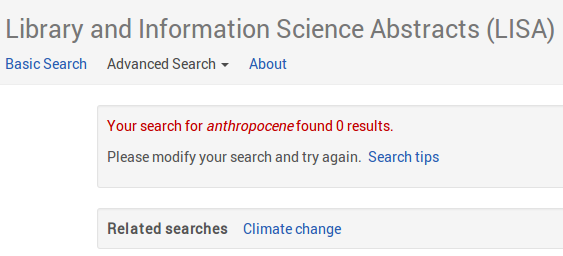
“Climate change” is one of its subject terms, however, and that shows 17 results today:
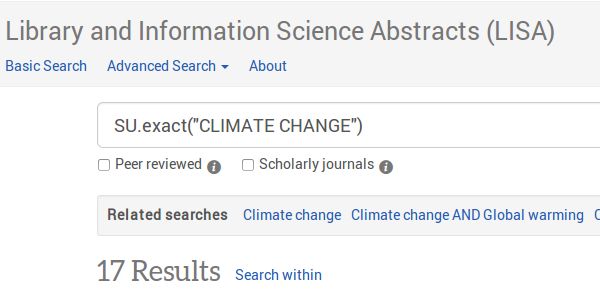
Here they are:
- Adamich, Tom et al. “The Gov Doc Kids Group and Free Government Information.” IFLA Journal 38.1 (2012): 68–77.
- Dutt, Bharvi, K. C. Garg, and Archita Bhatta. “A Quantitative Assessment of the Articles on Environmental Issues Published in English-Language Indian Dailies.” Annals of Library and Information Studies 60.3 (2013): 219–226.
- Elia, Emmanuel F., Stephen Mutula, and Christine Stilwell. “Indigenous Knowledge Use in Seasonal Weather Forecasting in Tanzania: The Case of Semi-Arid Central Tanzania.” South African Journal of Libraries and Information Science 80.1 (2014): 18–27.
- Etti, Susanne et al. “Growing the ERM Energy and Climate Change Practice Through Knowledge Sharing.” Journal of Information & Knowledge Management 9.3 (2010): 241–250.
- Gordon-Clark, Matthew. “Paradise Lost? Pacific Island Archives Threatened by Climate Change.” Archival Science 12.1 (2012): 51–67.
- Hall, Richard. “Towards a Resilient Strategy for Technology-Enhanced Learning.” Campus-Wide Information Systems 28.4 (2011): 234–249.
- Hiroshi, Hirano. “Usage details of the Earth Simulator and sustained performance of actual applications.” Journal of Information Processing and Management 48.5 (2005): 268–275.
- Holgate, Becky. “Global Climate Change.” The School Librarian 63.2 (2015): 84.
- Islam, Md. Shariful. “The Community Development Library in Bangladesh.” Information Development 25.2 (2009): 99–111.
- Johansen, Bruce E. “Media Literacy and ‘Weather Wars:’ Hard Science and Hardball Politics at NASA.” SIMILE: Studies in Media & Information Literacy Education 6.3 (2006): np.
- Luz, Saturnino, Masood Masoodian, and Manuel Cesario. “Disease Surveillance and Patient Care in Remote Regions: An Exploratory Study of Collaboration among Health-Care Professionals in Amazonia.” Behaviour & Information Technology 34.6 (1507): 548–565.
- Murgatroyd, Peter, and Philip Calvert. “Information-Seeking and Information-Sharing Behavior in the Climate Change Community of Practice in the Pacific.” Science & Technology Libraries 32.4 (2013): 379–401.
- Mwalukasa, Nicholaus. “Agricultural Information Sources Used for Climate Change Adaptation in Tanzania.” Library Review 62.4-5 (2013): 266–292.
- Sabou, Marta, Arno Scharl, and Michael Fols. “Crowdsourced Knowledge Acquisition: Towards Hybrid-Genre Workflows.” International Journal on Semantic Web and Information Systems 9.3 (2013): 14–41.
- Stoss, F. W. “The Heat Is on! U.S. Global Climate Change Research and Policy.” EContent 23.4 (2000): 36–38.
- Vaughan, K. T. L. “Science and Technology Sources on the Internet. Global Warming and Climate Change Science.” Issues in Science and Technology Librarianship 32 (2001): n. pag.
- Veefkind, V. et al. “A New EPO Classification Scheme for Climate Change Mitigation Technologies.” World Patent Information 34.2 (2012): 106–111.
Quite a mix, from around the world, and representative of the wide range of subject matter LIS has in its scope.
But only 17? Since 2000? This certainly isn’t a full literature review, but 17 is far too few for even a quick search. We need a lot more work done.

The Journal of Anthropocene Librarianship
Perhaps we could start The Journal of Anthropocene Librarianship to focus and grow attention in our discipline, while still engaging in inter- and transdisciplinary work beyond LIS. Of course it would be fully open access.
I found three new journals on the the Anthropocene: Anthropocene (Elsevier, RoMEO green, allows some self-archiving), The Anthropocene Review (Sage), and Elementa: Science of the Anthropocene (BioOne, fully open access, see author guidelines). The introductory editorial in Anthropocene by Chin et al. sets out its aim:
Anthropocene openly seeks research that addresses the scale and extent of human interactions with the atmosphere, cryosphere, ecosystems, oceans, and landscapes. We especially encourage interdisciplinary studies that reveal insight on linkages and feedbacks among subsystems of Earth, including social institutions and the economy. We are concerned with phenomena ranging over time from geologic eras to single isolated events, and with spatial scales varying from grain scale to local, regional, and global scales. Papers that address new theoretical, empirical, and methodological advances are high priority for the Journal. We welcome contributions that elucidate deep history and those that address contemporary processes; we especially invite manuscripts with potential to guide and inform humanity into the future.
A broad approach like this but tailored to LIS could work well.
On the other hand, leaping to a journal is a big step. Maybe it’s best to follow the Code4Lib model: start with a mailing list and a web site, and grow. Or, do it all at once.

What about archives?
Libraries and archives work together closely but serve different purposes, and archivists are very different from librarians, so I won’t venture into describing what Anthropocene archives might be like. However, Matthew Gordon-Clark’s “Paradise Lost? Pacific Island Archives Threatened by Climate Change” (2012; the sea level rise predictions now are worse) is a perfect example of this work. Here’s the abstract:
Over the past 10 years, a clear pattern of increasing sea-level rises has been recorded across the Pacific region. As international work progresses on climate change, it is becoming clear that the expected rise of sea levels will have significant impacts upon low-lying islands and nations. Sea-level rises of less than 0.5 m are generally suggested, although some researchers have made more drastic projections. This paper describes the second stage of research into the impacts of climate change upon the national archival collections in low-lying Pacific islands and nations. This article follows on the argument that archival collection relocation will be necessary and sets the boundaries for further research. It will summarize current research into climate change models and predicted sea-level rises, identify Pacific islands and nations that will be the focus of detailed further research by setting a range of research boundaries based on the known geography of nations within the Pacific, arguing for a specific measurement of “low-elevation”, outlining other risk factors likely to affect the survival of threatened national archival collections and naming those islands and nations that are thus deemed to be at greatest risk of flooding and thus likely to need to relocate their archives. The goal is to demonstrate how archivists might inform the governmental policy in threatened islands and nations as well as what other nations might do to offer assistance.
A web search for anthropocene archives turns up a lot of results. Archives of the Anthropocene at the Max Planck Institute for the History of Science is interesting:
Taken seriously, the Anthropocene claims that the cultural has insinuated itself so thoroughly into the natural that any notion of an objective, unhumanized record of the earth will no longer be tenable. The Anthropocene hypothesis implies that the sciences of the archives will need to reorient themselves to a new, participatory sense of macro-duration and confront the possibilities that the unaccessioned “noise” of human artifacts might dwarf any authoritative signal that we believe our archives will communicate to the distant future.
Galleries and museums also have to deal with the problem. As a group we’re called the GLAM sector: galleries, libraries, archives and museums. Together: GLAMthropocene, saving the world.

Works cited
Boswell, James. The Life of Samuel Johnson, LL.D. Together with The Journal of a Tour to the Hebdrides. Vol. 3. London: George Bell & Sons, 1892.
Chin, Anne et al. “Anthropocene: Human Interactions with Earth Systems.” Anthropocene 1 (2013): 1–2. DOI: 10.1016/j.ancene.2013.10.001
Crutzen, Paul J. and Eugene F. Stoermer. “The 'Anthropocene’.” Global Change Newsletter 41 (2000): 17–18. http://www.igbp.net/download/18.316f18321323470177580001401/1376383088452/NL41.pdf
Gordon-Clark, Matthew. “Paradise Lost? Pacific Island Archives Threatened by Climate Change.” Archival Science 12.1 (2012): 51–67. DOI: 10.1007/s10502-011-9144-3
Graeber, David. “Anthropology and the rise of the professional-managerial class.” Journal of Ethnographic Theory 4.3 (2014): 73–88. http://www.haujournal.org/index.php/hau/article/view/hau4.3.007/1651

Foul, rainy, muddy sloppy morning
“It was a foul, rainy, muddy, sloppy morning, without a glimmer of sun, with that thick, pervading, melancholy atmosphere which forces for the time upon imaginative men a conviction that nothing is worth anything,” —Anthony Trollope, Ralph the Heir (1871), chapter XXIX.
Moderate Dinginess
York University, where I work, meets the international institutional cleanliness standard of Moderate Dinginess. I won’t show you pictures.
APPA: Leadership in Educational Facilities (formerly the Association of Physical Plant Administrators, then “APPA: The Association of Higher Education Facilities Officers”) is the body that sets these standards. Their documentation seems to be behind a subscription wall, and I don’t have access to Custodial Staffing Guidelines for Educational Facilities (where this seems to originate) in print, but searching for ‘moderate dinginess’ turns up lots of presentations from universities, and detailed information on the Asset Insights site that covers all five cleanliness categories, from Orderly Spotlessness down to Unkempt Neglect.
About Moderate Dinginess, it says:
- Floors are swept or vacuumed clean, but are dull, dingy, and stained.
- There is a noticeable buildup of dirt and/or floor finish in corners and along walls.
- There is a dull path and/or obviously matted carpet in walking lanes.
- Base molding is dull and dingy with streaks or splashes. All vertical and horizontal surfaces have conspicuous dust, dirt, smudges, fingerprints, and marks.
- Lamp fixtures are dirty and some lamp (up to 5 percent) is burned out.
- Trash containers have old trash and shavings. They are stained and marked.
- Trash containers smell sour.
This accurately describes all of the libraries and almost all the other buildings on campus, exceptions being the brand new engineering building, the building where the president’s office is, and the building where marketing and fundraising are.
Meanwhile, improving the student experience is one of the key priorities of the university.
My Three Rules of Reading
I have three rules of reading.
Rule 0. Stop reading a book whenever you feel like it.
I know people who say that once they start reading a book they just have to finish it even if they don’t like it. Bah! Then there’s Nancy Pearl’s Rule of 50, which says you should wait to decide until you’ve finished page 50. I’ve seen something about reading (100 minus your age) pages, too—as though a ten-year-old should waste their time reading 90 pages of some tedious book just out of a sense of duty.
I’m a librarian and therefore an expert on these matters. My advice is: stop reading a book whenever you feel like it. I’ve dropped books after 400 pages (War and Peace), 90 pages, 50 pages, one page … I’ve even dropped a book midway through the first sentence. When you know, you know.
Rule 1. Only read books where direct speech is delimited in quotes.
This is OK:
“Hello,” she said.
“Hello,” he said, “I need some of more that …”
He gestured at the shelf.
“Cat food?”
“Yeah.”
This is not:
Hello.
Hello. I need some more of that …
He gestured at the shelf.
Cat food?
Yeah.
I decided about ten years ago I just didn’t have time for all that. Conversation should be quoted. This has meant that I don’t read James Joyce, Flann O'Brien, Cormac McCarthy, and a lot of modernists, but I don’t mind. Generally this rule works because anyone that adopts this style is probably the kind of writer I’m not going to like anyway, so it’s a good warning sign.
I know I’m missing some writers I would like, but to them I suggest: start using quotation marks.
Rule 2. Never read a book where the killer’s narrative is in alternate chapters in italics.
Chapter 4
He waited outside the bus station, watching as the overnight from Timmins discharged its tired riders. One of them would be right for him. This morning, he would kill again. He was ready. It was time.
This rule is on my mind because I just finished Robert Galbraith’s new novel Career of Evil. It’s very good, and I recommend the whole Cormoran Strike series—only three books so far, but I look forward to more. There are several chapters (but not every other one) told from the killer’s point of view (but not in italics). It just squeaked by Rule 2, and I’m glad it did.
Metal librarianship
A short pointer to Netanel Ganin’s blog post Some help for the Iron Maiden researchers, which gives MARC-formatted LCSH subject headings for Iron Maiden songs. Metal librarianship! Enough with the cats and cardigans, people. Throw the horns.
No librarian or archivist should vote Conservative in the Canadian election
The American Library Association’s Core Values of Librarianship seem right to me. Stephen Harper and the Conservatives stand against every single one of them.
- access
- confidentiality/privacy
- democracy
- diversity
- education and lifelong learning
- intellectual freedom
- preservation
- the public good
- professionalism
- service
- social responsibility
The list of what they’ve done is overwhelming, but covered well here:
- Vanishing Canada: Why we’re all losers in Ottawa’s war on data by Anne Kingston in Macleans
- Stephen Harper: Master manipulator by Nick Davies in the Guardian
- 2011-2015 Harper Government Wrap-up by “Dave” on the 24 Percent Majority blog
- The Canadian War on Science: A long, unexaggerated, devastating chronological indictment by my colleague John Dupuis on his blog Confessions of a Science Librarian
Of the many terrible things Harper is doing—and he’s almost entirely solely responsible for everything the government has done—the most relevant for libraries and archives is the sustained war on truth, fact and history. He is trying to prevent there from being any basis in fact for any argument about any policy and to prevent any informed expert from making public facts that go against his plans.
The damage done to the country just by stopping the long-form census is permanent, and that’s just one small part of the irreparable harm he’s caused.
It is professionally unethical for any librarian or archivist in Canada to vote Conservative in this election. I encourage all my colleagues across the country to vote for other parties.
(Note: This opinion is mine and does not represent York University, where I work. The academic freedom section of our collective agreement says, “When exercising their rights of action and expression as citizens, employees shall endeavour to ensure that their private actions or expressions are not interpreted as representing positions of York University.” Consider it done.)
Book City
I got something nice in the mail last week: a bright yellow certificate for $5 off my next purchase at Book City, the four-store Toronto bookstore chain.
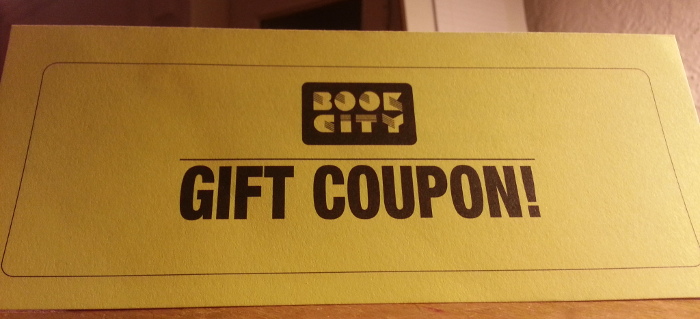
I got it because I have a Book City loyalty card. It costs $20, and gets me 10% off every book I buy there plus an extra 10% off all new hardcovers, plus $5 on my birthday (I lied to them about when it is, of course), and $5 for every $300 I spend there. My fake birthday just arrived and I got this nice present.
I don’t remember the first time I bought a book at Book City, but as soon as I moved to Toronto in 1985, I started buying books there. There used to be a lot of bookstores in Toronto, of course. There were all the used bookstores on Harbord and Queen West, which are all gone now (though Bakka is on Harbord, as are two or three other stores selling new books). There was the Reader’s Den on Bloor, where I worked from 1990–1993 when it went bankrupt in the recession. (After that I interviewed at Book City, but didn’t get hired. No hard feelings.) There was a store in Yorkville whose name I forget. There was Lichtman’s. There was Britnell’s. All gone.
They’re all gone because of Chapters and Indigo, which began as two separate monster bookstore chains but merged in 2001. They almost entirely crushed all competition across Canada and then expanded into the apparently more profitable arena of candles, photo albums and smugness.
And of course they’re all gone because of Amazon.
I used to buy a lot of books on Amazon. It’s so easy: any book you might possibly want is listed, and when you’re looking at one it suggests all sorts of others you might like, and it’s probably right. Press a couple of buttons and in two days the books are in your mailbox. You can go from “I think I might like this book” to “I want this book” to “SEND ME THIS BOOK NOW” in a few seconds.
In March 2014 I was walking along Bloor Street West late one night and passed the Book City store that I’d been shopping at for thirty years. It was closed down! I was completely surprised and utterly appalled.
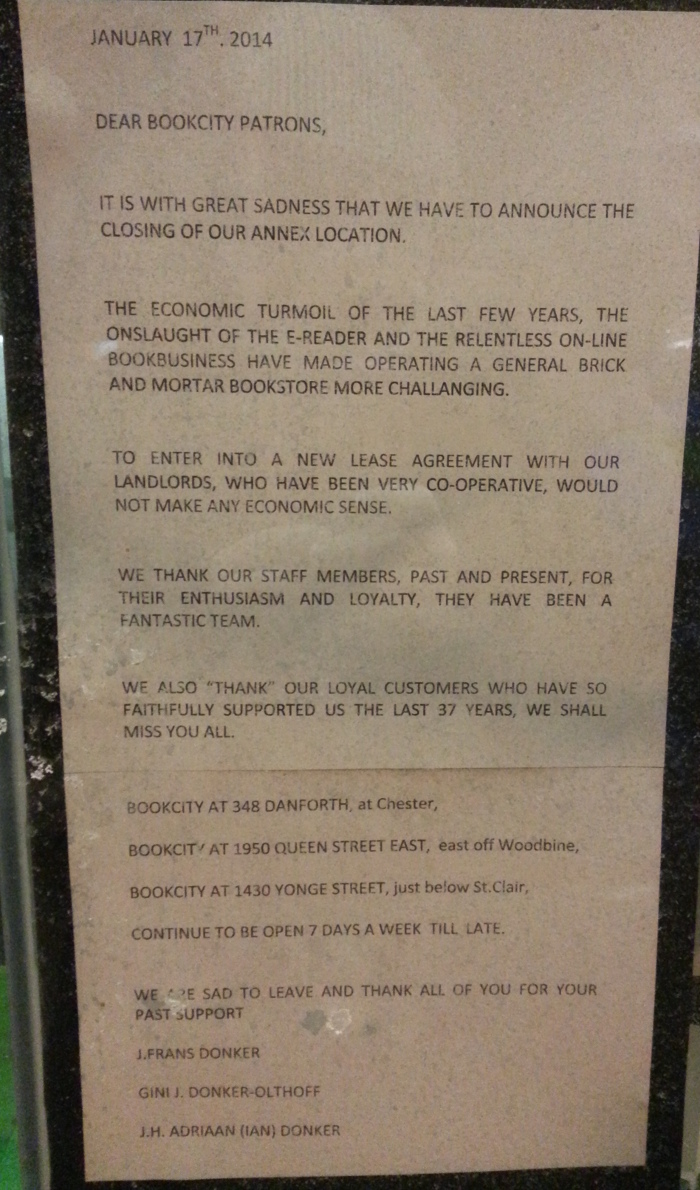
That was the last straw. I’d been meaning to change my habits, but that was it. I decided that night I wouldn’t buy from Amazon again. I haven’t.
I’d been meaning to change my habits because of the early 2014 news about how terribly Amazon treated its workers. Salon’s Worse than Wal-Mart: Amazon’s sick brutality and secret history of ruthlessly intimidating workers lays it out.
Perhaps the biggest scandal in Amazon’s recent history took place at its Allentown, Pennsylvania, center during the summer of 2011. The scandal was the subject of a prizewinning series in the Allentown newspaper, the Morning Call, by its reporter Spencer Soper. The series revealed the lengths Amazon was prepared to go to keep costs down and output high and yielded a singular image of Amazon’s ruthlessness—ambulances stationed on hot days at the Amazon center to take employees suffering from heat stroke to the hospital. Despite the summer weather, there was no air-conditioning in the depot, and Amazon refused to let fresh air circulate by opening loading doors at either end of the depot—for fear of theft. Inside the plant there was no slackening of the pace, even as temperatures rose to more than 100 degrees.
Seeing a Book City branch close down made it very local and very real. By using Amazon I was supporting a bad company and I was putting a friendly local bookstore out of business.
And they are friendly. I started emailing my local Book City branch: “There’s a book I’d like to get—do you have it?” “The new Terry Pratchett is coming out next month. Please set one aside and let me know when it’s in.” A couple of times a month, I email them. The next day Chris or Phil or Alison replies and says, “We have that, and I put it behind the counter for you,” or, “I’ve put in an order for it,” or “It won’t be out for three months but when it comes in we’ll let you know right away.” If they have the book now, I go over and get it. If I have to wait, I know they’re reliable, and sure enough, the book arrives, they email me, and I go get it.
I’m in the store every couple of weeks, picking something up or just looking around. A couple of times I’ve done impromptu reader’s advisory for customers. Sometimes I chat with the clerks. (Other times I listen to them, and remember back when I worked in a bookstore, and had the same belief that no customer in the store could hear what I was saying to my fellow clerk.) They know me now, and if there’s a book on hold for me, when I go the counter, they’ve pulled it out and it’s ready for me.
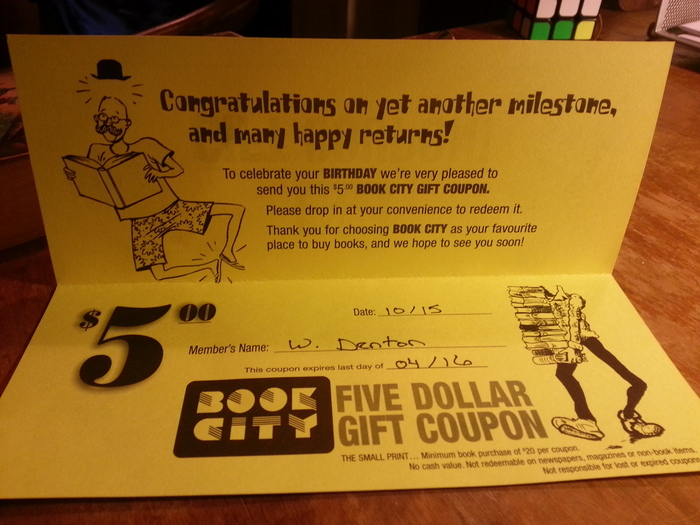
In August there was another long investigate piece about Amazon’s work practices, this one in the New York Times: Inside Amazon: Wrestling Big Ideas in a Bruising Workplace. It got a lot of discussion going, including among friends.
It didn’t change my behaviour, though. I’d already changed. I told people about how I’d moved to Book City and encouraged them to do the same. A few days later, like usual, I emailed Book City to say I needed a book, and they said they’d get it, and they did.
I don’t need books delivered to my door through the oppressive machinations of an internet billionaire. I’m happy to walk a little ways and get them from real people in a real Toronto bookstore.
 Miskatonic University Press
Miskatonic University Press